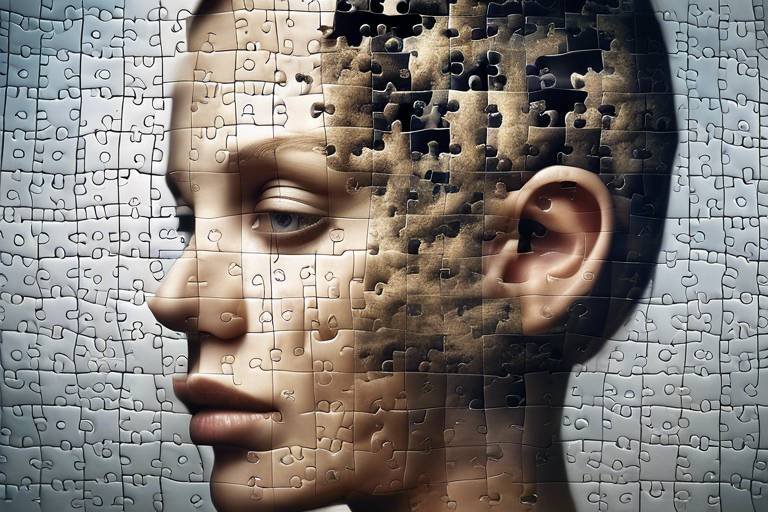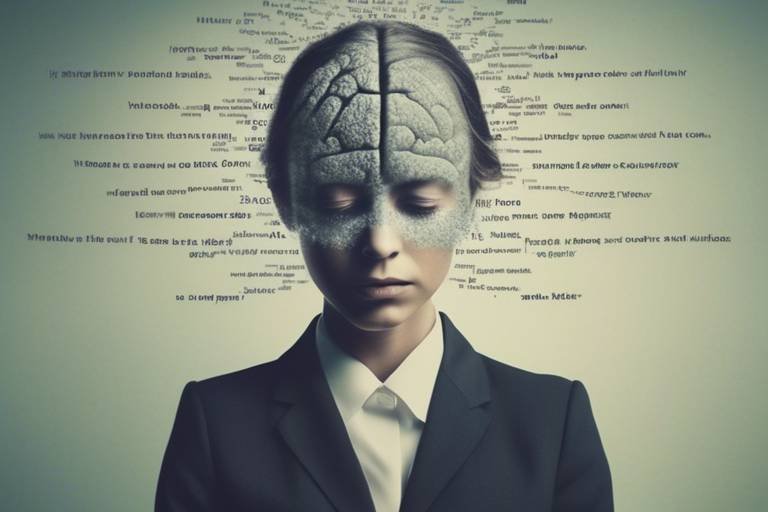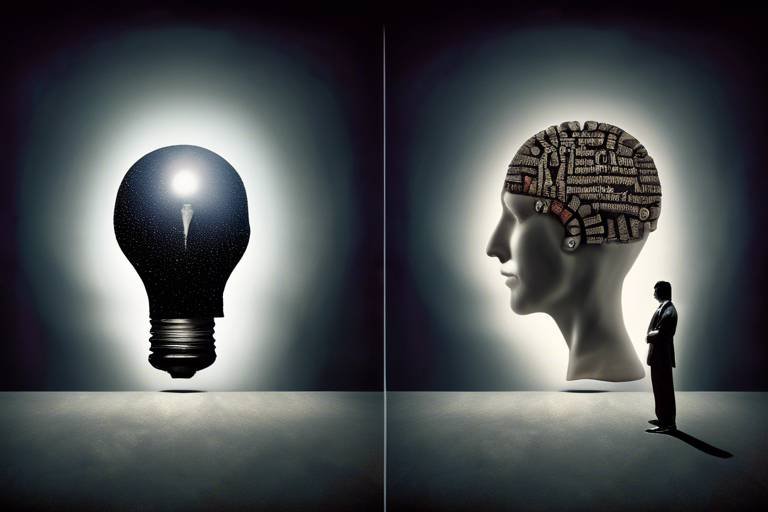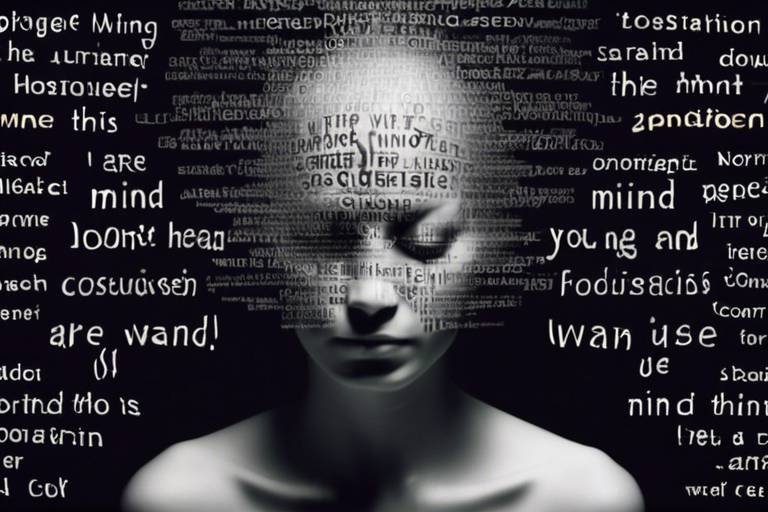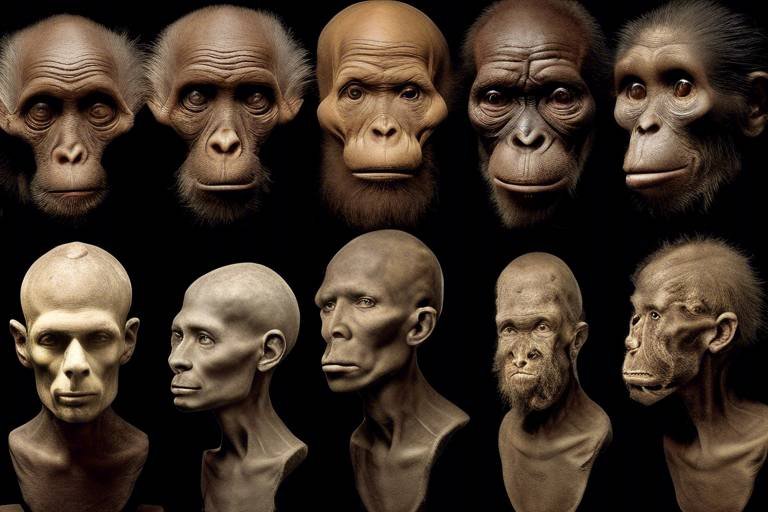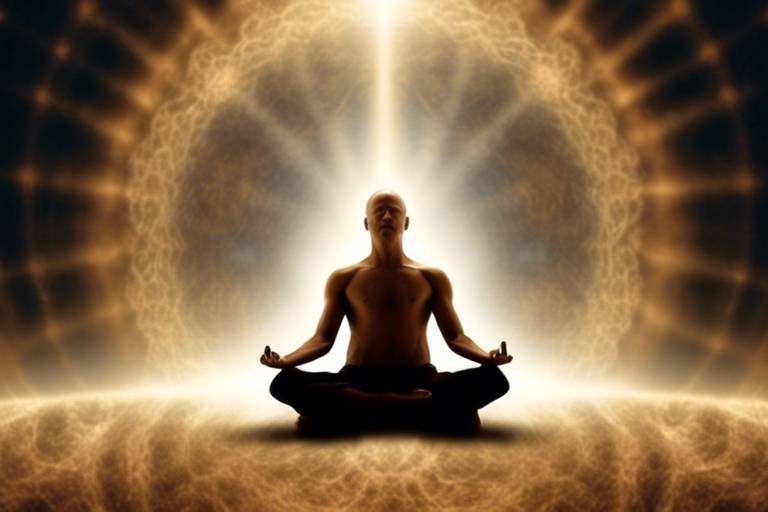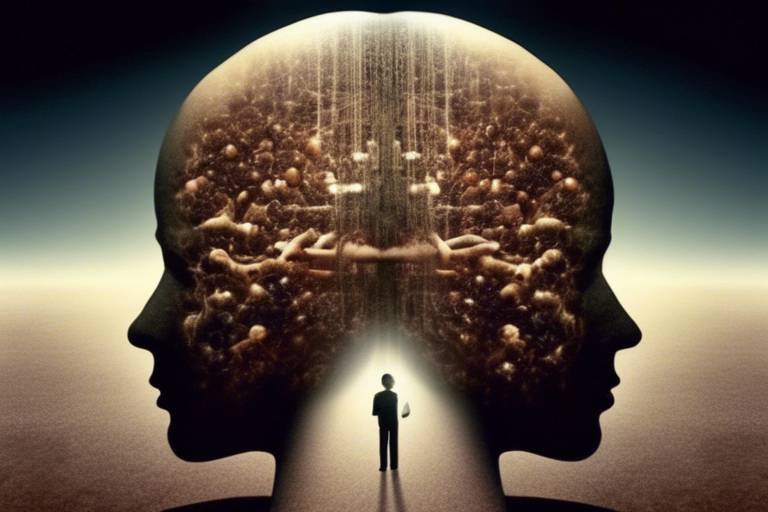The Puzzle of Human Consciousness - A Contemporary Concern
Have you ever found yourself lost in thought, pondering the very nature of your being? The mystery of human consciousness is a topic that has fascinated philosophers, scientists, and curious minds alike for centuries. It’s like trying to assemble a jigsaw puzzle without knowing what the final picture looks like. Each piece represents a different aspect of consciousness, from our thoughts and emotions to our memories and perceptions. This article dives deep into the complexities of consciousness, exploring its definitions, theories, and implications in our modern society.
At its core, consciousness is what makes us aware of ourselves and our surroundings. It’s the internal dialogue that runs through our minds, the sensations we experience, and the thoughts we entertain. Yet, despite its significance, consciousness remains one of the most elusive subjects in both philosophy and science. How do we distinguish between being conscious and unconscious? What does it mean to truly "know" oneself? These questions lead us down a rabbit hole of inquiry that challenges our understanding of existence itself.
In today’s world, where technology and science are evolving at an unprecedented pace, the exploration of consciousness has taken on new dimensions. With advancements in neuroscience and cognitive psychology, researchers are striving to decode the mechanisms behind our conscious thoughts and feelings. But as we delve deeper into the brain’s inner workings, we must also confront the ethical implications of our discoveries. What responsibilities do we hold towards other conscious beings, including animals and artificial intelligences? As we seek answers, we must also grapple with the profound significance of consciousness in shaping our identities, actions, and moral frameworks.
This article aims to unravel the intricate threads of consciousness, examining not only its definitions and historical perspectives but also its impact on personal identity and ethical considerations. By the end of this exploration, we hope to shed light on the ever-evolving puzzle of human consciousness and its relevance in our contemporary world.
To truly grasp the essence of consciousness, one must first understand its fundamental definitions. In simple terms, consciousness can be described as the state of being aware of and able to think about one’s own existence, thoughts, and surroundings. It’s the experience of being alive and engaged with the world around us. But how does this differ from unconscious states, such as sleep or coma? The distinction lies in the ability to process information, respond to stimuli, and maintain a sense of self-awareness.
In philosophical contexts, consciousness has been a subject of debate for centuries. Thinkers like René Descartes famously declared, "I think, therefore I am," suggesting that the very act of thinking is proof of one’s existence. On the other hand, scientific approaches focus on the biological and neurological underpinnings of consciousness, exploring how brain activity correlates with our conscious experiences. This intersection of philosophy and science creates a rich tapestry of inquiry, inviting us to explore the depths of human awareness.
The history of consciousness is a fascinating journey that reflects the evolution of human thought. From ancient philosophies that pondered the nature of the soul to modern psychological theories that analyze cognitive processes, our understanding of consciousness has transformed dramatically. Key thinkers such as Plato, Aristotle, and Immanuel Kant have all contributed to this discourse, each offering unique insights into the mysteries of the mind.
When it comes to philosophical theories about consciousness, there are several prominent schools of thought. For instance, dualism posits a separation between the mind and body, suggesting that consciousness exists independently of physical processes. In contrast, materialism argues that consciousness arises solely from brain activity, emphasizing a more scientific approach to understanding the mind. Then there’s phenomenology, which focuses on subjective experience, highlighting how our personal perceptions shape our understanding of consciousness and existence.
The ongoing debate between dualism and materialism encapsulates the struggle to understand consciousness. Dualists argue that consciousness is a non-physical entity, while materialists contend that it is a product of physical processes in the brain. This clash of perspectives raises important questions about the nature of reality and our place within it.
Phenomenology, on the other hand, invites us to consider how our lived experiences inform our understanding of consciousness. It emphasizes the importance of personal perception, suggesting that our subjective experiences are fundamental to our awareness. This perspective encourages us to reflect on our unique experiences and how they shape our identities.
In recent years, scientific investigations into consciousness have gained momentum, particularly in fields like neuroscience and cognitive psychology. Researchers are employing advanced imaging techniques to observe brain activity during conscious states, seeking to uncover the mechanisms that underlie our thoughts and awareness. These empirical studies are shedding light on the biological basis of consciousness, bridging the gap between philosophy and science.
The relationship between consciousness and personal identity is a profound one. Our conscious experiences play a crucial role in shaping our sense of self, influencing our decisions, actions, and interactions with others. As we navigate through life, our memories, emotions, and thoughts intertwine to create a cohesive narrative that defines who we are.
Memory serves as a vital link between consciousness and identity. Our recollections not only inform our understanding of past experiences but also shape our present consciousness. They provide context and continuity, allowing us to construct a coherent self-image over time. Without memory, our conscious experience would be fragmented, making it challenging to form a stable identity.
Attention is another critical aspect of consciousness. It acts as a spotlight, illuminating certain aspects of our experience while leaving others in the shadows. By selectively focusing our attention, we can enhance our awareness and perception of the world around us. This selective nature of attention significantly impacts our cognitive processes, shaping our conscious experiences and influencing how we interact with our environment.
As we delve deeper into the nature of consciousness, we must also consider the ethical implications that arise from our understanding. Debates surrounding animal consciousness, for instance, challenge us to reconsider our moral responsibilities towards non-human beings. If animals possess a form of consciousness, what obligations do we have to ensure their well-being?
Moreover, the rise of artificial intelligence poses new ethical dilemmas. As we create machines that exhibit behaviors resembling consciousness, we must grapple with questions about their rights and the moral responsibilities we hold towards them. The exploration of consciousness is not merely an academic exercise; it has real-world implications that demand our attention and reflection.
- What is consciousness? Consciousness refers to the state of being aware of and able to think about one's own existence, thoughts, and surroundings.
- How does consciousness differ from unconsciousness? Consciousness involves awareness and cognitive processing, while unconsciousness refers to a lack of awareness and responsiveness.
- What are the main theories of consciousness? Key theories include dualism, materialism, and phenomenology, each offering different perspectives on the nature of consciousness.
- Why is consciousness important for personal identity? Our conscious experiences shape our sense of self and influence our decisions and actions, forming the narrative of our lives.
- What ethical considerations arise from our understanding of consciousness? Ethical implications include debates on animal rights, the treatment of conscious beings, and the responsibilities associated with artificial intelligence.

Understanding Consciousness
Consciousness is one of those enigmatic concepts that seem to elude a straightforward definition, much like trying to catch smoke with your bare hands. At its core, consciousness refers to the state of being aware of and able to think about one's own existence, thoughts, and surroundings. It’s that little voice in your head that narrates your life, the feeling of being "you" in a world full of "others." But what does it really mean to be conscious? How do we differentiate between being awake and truly aware?
To unravel this puzzle, we must first acknowledge that consciousness is not a monolithic experience; it varies widely among individuals and contexts. It encompasses a spectrum that ranges from full alertness to deep sleep, and even into states of altered consciousness, such as dreaming or meditative states. This complexity raises fundamental questions: Is consciousness merely a byproduct of brain activity, or does it represent something more profound? Philosophers and scientists alike have grappled with these questions, leading to a rich tapestry of theories and debates.
In philosophical terms, consciousness is often categorized into two essential aspects:
- Phenomenal consciousness, which refers to the subjective experience of sensations and feelings—what it feels like to see a sunset or taste chocolate.
- Access consciousness, which involves the ability to report on those experiences and use them in reasoning and decision-making.
From a scientific perspective, consciousness is often linked to specific brain functions and neural mechanisms. Neuroscientists have made significant strides in understanding how different regions of the brain contribute to our conscious experiences. For instance, the prefrontal cortex is heavily involved in decision-making and self-reflection, while the thalamus acts as a relay station for sensory information, playing a pivotal role in our awareness of the environment.
However, despite these advancements, the "hard problem" of consciousness remains unresolved. This term, coined by philosopher David Chalmers, refers to the challenge of explaining why and how physical processes in the brain give rise to subjective experiences. Imagine trying to explain the taste of chocolate to someone who has never tasted it; that's the essence of the hard problem. It’s a riddle that continues to baffle researchers and thinkers alike.
In summary, understanding consciousness is not just an academic exercise; it touches on the very essence of what it means to be human. It influences our perceptions, shapes our identities, and informs our interactions with the world. As we delve deeper into the mysteries of consciousness, we may find that it holds the key to understanding ourselves and our place in the universe.

Historical Perspectives
The exploration of consciousness has been a captivating journey through time, with thinkers from various eras contributing to our understanding of this complex phenomenon. From the musings of ancient philosophers to the insights of modern psychologists, the evolution of consciousness theories reflects not just a change in thought but also a shift in cultural and scientific paradigms. It’s fascinating to consider how our ancestors viewed consciousness—were they aware that the very essence of what makes us human would become a subject of intense debate and inquiry?
In ancient times, philosophers like Socrates and Plato laid the groundwork for understanding the mind and its relationship to the body. They proposed that consciousness was linked to a realm of ideals, suggesting that our perceptions were mere shadows of a more profound reality. Fast forward to the Enlightenment, and we encounter René Descartes, who famously declared, "I think, therefore I am." His dualistic approach posited a distinct separation between mind and body, a notion that sparked considerable discussion and dissent among thinkers who followed.
As we moved into the 19th century, the advent of psychology as a formal discipline began to reshape our understanding of consciousness. Figures like Wilhelm Wundt and William James emphasized the importance of introspection and the subjective experience of consciousness. Wundt's establishment of the first psychological laboratory in 1879 marked a pivotal moment in the scientific study of the mind. Meanwhile, James introduced the concept of "stream of consciousness," highlighting the fluid and dynamic nature of our thoughts and awareness.
Throughout the 20th century, various movements emerged, each offering unique perspectives on consciousness. The rise of behaviorism, championed by B.F. Skinner, sought to eliminate the subjective nature of consciousness from psychological inquiry, focusing instead on observable behaviors. However, this approach faced criticism for neglecting the internal experiences that are essential to understanding the human condition. In contrast, the cognitive revolution of the 1960s and 70s reignited interest in mental processes, paving the way for a more integrated view of consciousness that considers both behavior and internal states.
Today, the study of consciousness continues to evolve, incorporating insights from neuroscience, philosophy, and psychology. Researchers utilize advanced imaging techniques to explore the brain's inner workings, seeking to unravel the mysteries of awareness and perception. The table below summarizes key historical milestones in the study of consciousness:
| Era | Key Thinkers | Contributions |
|---|---|---|
| Ancient Philosophy | Socrates, Plato | Theory of Forms, Mind-Body Dualism |
| Enlightenment | René Descartes | Cogito ergo sum, Mind-Body Separation |
| 19th Century | Wilhelm Wundt, William James | Introspection, Stream of Consciousness |
| 20th Century | B.F. Skinner, Cognitive Psychologists | Behaviorism, Cognitive Revolution |
| Contemporary | Neuroscientists, Philosophers | Neuroscience of Consciousness, Integrated Approaches |
As we reflect on these historical perspectives, it becomes clear that our understanding of consciousness is not static; it is a living, breathing entity that evolves alongside human thought and discovery. Each era has contributed layers of complexity, shaping how we perceive ourselves and our place in the universe. So, what does the future hold for the study of consciousness? Will we ever fully grasp its intricacies, or will it remain one of life’s great mysteries, tantalizingly out of reach?

Philosophical Approaches
When we dive into the realm of philosophy, we encounter a rich tapestry of ideas regarding consciousness that have evolved over centuries. Philosophers have long grappled with the question: what does it mean to be conscious? This inquiry has birthed various schools of thought, each offering unique perspectives on the nature of consciousness. Among these, dualism, materialism, and phenomenology stand out as the primary contenders in the philosophical debate.
Dualism, famously championed by René Descartes, posits that the mind and body are fundamentally different substances. This perspective suggests that while our physical bodies operate within the realm of the tangible, our minds exist in a non-physical domain. Imagine a computer: the hardware (body) functions independently of the software (mind). This separation raises profound questions about the nature of self and existence. How can something non-physical interact with the physical world? This is the crux of the dualist dilemma, and it has sparked countless discussions among philosophers and scientists alike.
On the flip side, we have materialism, which argues that consciousness is a byproduct of physical processes within the brain. Think of it like a complex machine: every cog and gear (neuron and synapse) contributes to the overall function. Materialists contend that understanding the brain's workings will ultimately unlock the mysteries of consciousness. This perspective aligns closely with contemporary scientific inquiries, as researchers strive to map out the neural correlates of conscious experience. However, this raises another question: if everything about our consciousness can be reduced to brain activity, what happens to the concept of free will?
Then there's phenomenology, a philosophical movement that emphasizes the importance of personal experience. Rather than merely studying consciousness from an external viewpoint, phenomenologists advocate for exploring how individuals perceive and interpret their experiences. This approach is akin to stepping into someone else's shoes and viewing the world through their eyes. By focusing on subjective experience, phenomenology seeks to understand how consciousness is intertwined with our lived realities. It asks: how do our perceptions shape our understanding of ourselves and the world around us?
To summarize these philosophical approaches, we can look at the following table:
| Philosophical Approach | Key Idea | Notable Thinkers |
|---|---|---|
| Dualism | Mind and body are separate entities | René Descartes |
| Materialism | Consciousness arises from physical processes | Daniel Dennett |
| Phenomenology | Focus on subjective experience and perception | Edmund Husserl, Maurice Merleau-Ponty |
As we navigate these philosophical waters, it becomes clear that the discussions surrounding consciousness are not just academic exercises; they have profound implications for our understanding of identity, morality, and the very essence of what it means to be human. Each approach offers valuable insights, yet they also raise further questions that challenge our perceptions and beliefs. Are we simply products of our biology, or is there something more transcendent at play? The exploration of consciousness remains a captivating puzzle, one that invites us to reflect on our own experiences and the nature of reality itself.
- What is consciousness? Consciousness refers to the state of being aware of and able to think about one's own existence, thoughts, and surroundings.
- What are the main philosophical theories of consciousness? The main theories include dualism, materialism, and phenomenology, each offering different perspectives on the nature of consciousness.
- Why is the study of consciousness important? Understanding consciousness is crucial as it influences our sense of self, our interactions with others, and our moral responsibilities towards conscious beings.

Dualism vs. Materialism
The debate between dualism and materialism is one of the most fascinating and enduring discussions in the philosophy of mind. At its core, dualism posits that the mind and body are distinct entities. This perspective, famously championed by philosopher René Descartes, suggests that our mental experiences—thoughts, feelings, and consciousness—are fundamentally separate from our physical bodies. Imagine for a moment that your mind is like a software program running on a computer; it can exist independently of the hardware. This separation raises profound questions about the nature of existence and self-awareness.
On the other hand, materialism takes a more grounded approach, arguing that everything about consciousness can be explained through physical processes in the brain. According to this view, our thoughts and feelings are merely the byproducts of neural activity. Picture the brain as a complex machine, where every cog and wheel—every neuron and synapse—works together to produce our conscious experience. This perspective aligns closely with contemporary scientific understandings, particularly in neuroscience, where researchers aim to map brain activity to specific thoughts and emotions.
To better illustrate the differences, consider the following table:
| Aspect | Dualism | Materialism |
|---|---|---|
| Nature of Mind | Separate from the body | Part of the physical brain |
| Philosophical Roots | Descartes, Plato | Hobbes, Marx |
| Scientific Correlation | Less empirical evidence | Supported by neuroscience |
| Implications on Identity | Immortal soul concept | Identity tied to brain function |
This table succinctly captures the contrasting views of dualism and materialism. While dualism allows for the notion of an eternal soul or essence beyond the physical, materialism grounds our understanding in observable phenomena. However, the implications of each perspective stretch far beyond mere academic debate. For instance, if dualism is correct, it opens the door to questions about life after death and the nature of existence beyond our physical lives. Conversely, if materialism holds true, our understanding of consciousness becomes a matter of scientific inquiry, leading to potential advancements in artificial intelligence and cognitive therapies.
Ultimately, the clash between dualism and materialism reflects our deepest curiosities about what it means to be human. Are we merely biological machines, or is there something more profound at play? Each perspective offers unique insights into our consciousness, shaping not just philosophical discourse but also our everyday lives, relationships, and ethical considerations. As we continue to explore the complexities of the mind, the dialogue between these two schools of thought remains crucial, challenging us to rethink our understanding of identity, existence, and the very fabric of reality.
- What is dualism? Dualism is the philosophical belief that the mind and body are separate entities, with the mind existing independently of the physical body.
- What is materialism? Materialism is the view that consciousness and mental states arise from physical processes in the brain, suggesting that everything about the mind can be explained scientifically.
- Who were the key philosophers in this debate? Key figures in the dualism vs. materialism debate include René Descartes for dualism and Thomas Hobbes and Karl Marx for materialism.
- What are the implications of these theories? The implications of dualism and materialism affect our understanding of identity, ethics, and even the concept of an afterlife.

Phenomenology and Experience
Phenomenology is a fascinating branch of philosophy that dives deep into the rich tapestry of human experience. At its core, it emphasizes the importance of subjective experience and how individuals perceive the world around them. Imagine walking through a bustling market; the vibrant colors, the cacophony of sounds, and the tantalizing aromas all converge to create a unique moment that is entirely yours. This is the essence of phenomenology: it seeks to understand how such experiences shape our consciousness and, ultimately, our understanding of reality.
One of the key figures in phenomenology, Edmund Husserl, argued that to truly grasp the nature of consciousness, we must set aside preconceived notions and focus on the lived experience. This approach invites us to consider how we interpret our surroundings, our emotions, and even our thoughts. For instance, when you recall a cherished memory, it’s not just a static image in your mind; it’s a dynamic experience that evokes feelings, sensations, and even a sense of nostalgia. This interplay between memory and consciousness is a central theme in phenomenological studies.
Moreover, phenomenology challenges us to recognize that everyone experiences the world differently. Two people might witness the same sunset, yet one may find it breathtakingly beautiful while the other feels indifferent. This subjective quality of experience underscores the idea that consciousness is not merely a passive reflection of reality but an active engagement with it. It’s like being a painter with a canvas, where each brushstroke represents a unique perception shaped by personal history, emotions, and context.
In exploring phenomenology, we also encounter the concept of intentionality, which suggests that consciousness is always directed towards something. Whether it's a thought, an object, or an experience, our conscious awareness is inherently relational. This means that our understanding of ourselves and our existence is intricately linked to the world around us. For example, when we engage in a conversation, our consciousness is not just focused on our own thoughts but also on the responses and emotions of the other person. This relational aspect highlights the interconnectedness of human experiences.
Furthermore, phenomenology has practical implications in various fields such as psychology, art, and even artificial intelligence. In psychology, understanding how individuals perceive their experiences can lead to more effective therapeutic practices. In art, phenomenological perspectives can enhance our appreciation for how artists convey emotions and experiences through their work. And in artificial intelligence, recognizing the nuances of human experience can inform the development of more empathetic and intuitive machines.
In conclusion, phenomenology invites us to embark on a journey of self-discovery and understanding. By examining our experiences and recognizing their impact on our consciousness, we can gain deeper insights into what it means to be human. It’s a reminder that our perceptions, shaped by our unique histories and contexts, are not just fleeting moments but fundamental to our identity and existence.
- What is phenomenology?
Phenomenology is a philosophical approach that focuses on the study of consciousness and the structures of experience as they present themselves to consciousness.
- How does phenomenology differ from other philosophical approaches?
Unlike other philosophical approaches that may prioritize abstract reasoning or objective reality, phenomenology emphasizes subjective experience and the first-person perspective.
- What is intentionality in phenomenology?
Intentionality refers to the idea that consciousness is always directed towards something, whether it be thoughts, objects, or experiences.
- How can phenomenology be applied in everyday life?
By being more aware of our subjective experiences, we can enhance our understanding of ourselves and our interactions with others, leading to deeper connections and insights.

Scientific Investigations
When we dive into the realm of , we uncover a fascinating tapestry of research aimed at unraveling the enigmatic nature of consciousness. Scientists from various fields, including neuroscience and cognitive psychology, have dedicated countless hours to exploring how our minds work. But what exactly does this research entail, and why is it so crucial in understanding what it means to be conscious?
At the forefront of this exploration are neuroscientists who utilize advanced imaging techniques, such as functional magnetic resonance imaging (fMRI) and electroencephalography (EEG), to observe the brain in action. These tools allow researchers to pinpoint which areas of the brain are activated during specific cognitive tasks, shedding light on the relationship between brain activity and conscious experience. For instance, when you solve a complex math problem, certain regions of your brain light up, indicating a surge in neural activity. This correlation between brain function and conscious thought is a key area of investigation.
Moreover, cognitive psychology plays a pivotal role in understanding consciousness by examining how we perceive, think, and remember. Researchers conduct experiments to study phenomena such as selective attention and perceptual awareness. For example, the classic Stroop Effect experiment demonstrates how our attention can be influenced by conflicting information, revealing the complexities of conscious processing. This intersection of attention and consciousness is crucial, as it highlights how our awareness can be manipulated by external stimuli.
To further illustrate the scientific landscape of consciousness, let’s look at a few key areas of research:
| Research Area | Description |
|---|---|
| Neural Correlates of Consciousness | Investigating specific brain regions and their functions related to conscious experience. |
| Altered States of Consciousness | Studying how factors like meditation, drugs, and sleep affect our conscious experience. |
| Conscious vs. Unconscious Processing | Exploring the differences between what we are aware of and what happens subconsciously. |
While these scientific inquiries are essential, they also raise profound questions about the essence of consciousness itself. Are we merely the sum of our neural connections, or is there something more? The debate continues as researchers strive to bridge the gap between the biological mechanisms of the brain and the subjective experience of being aware.
In conclusion, the scientific investigations into consciousness are not just academic exercises; they hold real-world implications for how we understand ourselves and our place in the universe. As we continue to peel back the layers of this complex phenomenon, who knows what revelations await us? The exploration of consciousness is akin to embarking on a grand adventure, where each discovery leads us closer to understanding the very fabric of our existence.
- What is consciousness? Consciousness refers to the state of being aware of and able to think about one's own existence, thoughts, and surroundings.
- How do scientists study consciousness? Scientists use various methods, including brain imaging techniques and psychological experiments, to investigate how consciousness works.
- What is the significance of studying consciousness? Understanding consciousness can help us grasp the nature of human experience, identity, and the mind-body relationship.
- Are there different types of consciousness? Yes, consciousness can vary in states, such as waking, dreaming, and altered states induced by meditation or substances.

Consciousness and Identity
When we think about consciousness, it’s impossible to separate it from our sense of identity. After all, who we are is deeply intertwined with our conscious experiences. Imagine consciousness as a vast canvas, and our memories, thoughts, and feelings are the vibrant colors that paint the picture of our identity. Each brushstroke represents a moment, a decision, or an interaction that shapes how we see ourselves and the world around us.
The relationship between consciousness and identity is a fascinating puzzle. Our conscious experiences don’t just define us; they also influence our actions and decisions in profound ways. For instance, consider how a significant event, like graduating from college or losing a loved one, can alter our perception of who we are. These pivotal moments become part of our narrative, contributing to the ongoing story of our lives.
Moreover, the concept of identity is not static; it evolves as we encounter new experiences and challenges. This fluidity raises intriguing questions: Are we the same person we were five years ago? How do our memories and experiences shape our future selves? Our consciousness acts as a mirror, reflecting our past while simultaneously guiding our future. This dynamic interplay is what makes human identity so rich and complex.
To further understand this relationship, we can look at how various factors contribute to our sense of self:
- Memory: Our recollections are integral to our identity. They serve as the foundation upon which we build our self-concept. Without memory, we would struggle to connect our past experiences with our present self.
- Perception: How we perceive the world influences our identity. Our unique perspectives shape our beliefs, values, and ultimately, who we are.
- Social Interactions: The relationships we form with others play a crucial role in our identity. Through interactions, we gain insights into ourselves, often reflecting the identities of those around us.
In essence, consciousness is the stage upon which the play of identity unfolds. Each act is filled with the drama of our experiences, and each character represents a facet of our being. As we navigate through life, our conscious awareness allows us to reflect on our actions, learn from our mistakes, and grow into the individuals we aspire to be.
As we delve deeper into the nature of consciousness and identity, it’s essential to recognize that this relationship is not just a philosophical inquiry but also has real-world implications. For example, in the realm of psychology, understanding how consciousness shapes identity can lead to better therapeutic practices. Therapists often encourage clients to explore their conscious thoughts and feelings to help them understand their identities and make meaningful changes in their lives.
Furthermore, in our increasingly digital world, the exploration of consciousness and identity takes on new dimensions. Social media, virtual reality, and artificial intelligence challenge traditional notions of self. As we curate our online personas, we must ask ourselves: How does our digital identity reflect our true consciousness? Are we presenting an authentic version of ourselves, or are we merely playing a role?
Ultimately, the interplay between consciousness and identity is a rich field of exploration that invites us to reflect on our own lives. By understanding how our conscious experiences shape our identities, we gain valuable insights into what it means to be human. This journey of self-discovery is not only fascinating but also essential for personal growth and fulfillment.
- What is the relationship between consciousness and identity? Consciousness is the awareness of our thoughts, feelings, and experiences, which collectively shape our identity. Our conscious experiences influence how we see ourselves and make decisions.
- Can our identity change over time? Yes, our identity is fluid and can change based on new experiences, memories, and interactions with others.
- How does memory affect our sense of self? Memory serves as the foundation of our identity, connecting our past experiences to our present self and influencing our future actions.
- In what ways does digital media impact our identity? Digital media allows us to create curated identities that may or may not reflect our true selves, raising questions about authenticity and self-representation.

Memory and Consciousness
Memory and consciousness are intricately intertwined, forming a dynamic duo that shapes our self-identity and influences our daily interactions. Imagine your mind as a vast library, where each memory is a book filled with experiences, emotions, and knowledge. When we think about consciousness, we often consider our immediate awareness, but it’s essential to recognize that this awareness is heavily influenced by our memories. Our past experiences act as a lens through which we perceive the present, coloring our thoughts and feelings in ways we may not even realize.
At its core, consciousness is not just about being awake; it’s about being aware of our thoughts, surroundings, and the memories that inform our understanding of the world. When we recall a moment from our past, we aren’t just retrieving a fact; we’re engaging in a complex mental process that involves reconstructing emotions, context, and sensory details. This reconstruction can be surprisingly vivid, making us feel as though we are reliving the experience all over again. This phenomenon raises a fascinating question: How do our memories shape our conscious experience?
One significant aspect of this relationship is that our memories help form our identity. They serve as the building blocks of who we are, influencing our decisions, morals, and relationships. For instance, when we make a choice, we often draw upon past experiences to guide us. If we remember a time when a particular decision led to a positive outcome, we may be more inclined to repeat that action. Conversely, if a memory is tied to a negative experience, we might avoid similar choices in the future.
To illustrate this connection further, consider the following key points about memory and consciousness:
- Reconstructive Nature: Memories aren’t perfect records; they can be altered over time, influenced by our current emotions and beliefs.
- Emotional Influence: Emotions tied to memories can enhance or inhibit our conscious awareness of certain experiences.
- Impact on Decision-Making: Our recollections guide our choices, often subconsciously steering us toward familiar paths.
Moreover, the interplay between memory and consciousness can be seen in various psychological phenomena. For example, the concept of working memory refers to our ability to hold and manipulate information in our conscious mind for short periods. This is crucial for tasks like problem-solving and reasoning. When we engage in complex thought processes, we rely heavily on our memories to inform our current understanding and decision-making.
Research in neuroscience has revealed that specific brain regions are responsible for different types of memory, such as episodic memory (the recollection of personal experiences) and semantic memory (general knowledge about the world). The hippocampus, in particular, plays a vital role in forming new memories and connecting them to our conscious awareness. Damage to this area can lead to profound amnesia, highlighting just how essential memory is to our conscious experience.
In conclusion, the relationship between memory and consciousness is a fascinating area of study that continues to evolve. As we delve deeper into understanding how our memories shape our conscious experience, we uncover the profound ways in which our past influences our present. The interplay between these two elements not only enriches our understanding of the human mind but also deepens our appreciation for the complexity of our identity.
- How does memory affect our conscious awareness? Memory provides context and emotional depth to our conscious experiences, influencing how we perceive and react to the world around us.
- Can memories change over time? Yes, memories can be reconstructed and altered by new experiences or emotions, which can lead to inaccuracies in recall.
- What role does the hippocampus play in memory? The hippocampus is crucial for forming new memories and connecting them to our existing knowledge, significantly impacting our conscious awareness.

The Role of Attention
Attention is like a spotlight in the vast theater of our consciousness. It directs our focus, allowing us to prioritize information and experiences that matter most to us. Imagine walking into a crowded room filled with noise and chatter; without attention, it would be almost impossible to engage in a meaningful conversation. Attention enables us to filter out distractions and hone in on what is relevant, shaping our perception of the world around us.
But what exactly is the role of attention in consciousness? To put it simply, attention acts as a gatekeeper. It determines what enters our conscious awareness and what remains in the background. This process is crucial because our brains are bombarded with an overwhelming amount of sensory information every second. If we were to process everything simultaneously, we would quickly become overwhelmed. Instead, attention allows us to selectively concentrate on specific stimuli while ignoring others, thereby enhancing our cognitive efficiency.
Research has shown that attention is not just a passive process; it is highly dynamic and can be influenced by various factors, including our goals, interests, and emotional states. For instance, when we are excited or anxious, our attention may become hyper-focused on particular details that resonate with those feelings. This selective attention can significantly impact our memory and learning processes. When we pay attention to something, we are more likely to remember it later, which is why studying in a distraction-free environment often leads to better retention of information.
Moreover, attention plays a vital role in our decision-making processes. Consider how we navigate through choices every day, from what to eat for breakfast to which career path to pursue. Our attentional focus can sway our preferences and judgments. For example, if we pay more attention to negative reviews about a restaurant, we might decide against dining there, even if our previous experiences were positive. This illustrates how attention can shape our perceptions and influence our actions, sometimes leading us to make decisions based on incomplete information.
Interestingly, the relationship between attention and consciousness is also evident in conditions such as ADHD (Attention Deficit Hyperactivity Disorder). Individuals with ADHD often struggle with maintaining focus, which can lead to difficulties in various aspects of life, from academic performance to social interactions. Understanding how attention functions in these contexts can provide valuable insights into how we can support those who face such challenges.
In summary, attention is a fundamental component of our conscious experience. It allows us to navigate the complexities of our environment, influences our perceptions, and shapes our identities. As we continue to explore the intricacies of consciousness, it becomes increasingly clear that attention is not just a cognitive function; it is a powerful force that drives our interactions with the world.
- What is attention in psychology? Attention in psychology refers to the cognitive process of selectively concentrating on one aspect of the environment while ignoring others. It is crucial for processing information and making decisions.
- How does attention affect memory? Attention enhances memory retention by allowing us to focus on specific information, making it more likely to be encoded into long-term memory.
- Can attention be trained? Yes, attention can be trained through various techniques, such as mindfulness meditation, which helps improve focus and cognitive control.
- What are the types of attention? There are several types of attention, including selective attention, sustained attention, divided attention, and alternating attention, each serving different cognitive functions.

Ethical Implications
The exploration of consciousness is not just a philosophical or scientific endeavor; it is deeply intertwined with ethical considerations that affect both our understanding of ourselves and our treatment of other beings. As we delve into the complexities of consciousness, we must confront significant questions about the rights and moral responsibilities we hold toward conscious entities, whether they be humans, animals, or artificial intelligences. The implications are profound, as they challenge our existing frameworks of ethics and morality.
One of the most pressing ethical debates centers around animal consciousness. Recent studies suggest that many animals possess a level of consciousness that allows them to experience pain, joy, and a range of emotions. This realization raises questions about our responsibilities toward them. Should we continue to exploit animals for food, entertainment, and research if they are capable of suffering? The ethical implications are vast, prompting many to advocate for stricter regulations on animal welfare and even a reevaluation of our dietary choices.
Furthermore, as we advance in technology, the emergence of artificial intelligence (AI) introduces another layer of complexity. As AI systems become increasingly sophisticated, the question arises: can machines possess consciousness? If we create machines that can think, learn, and potentially experience awareness, what ethical obligations do we have toward them? Should we afford them rights similar to those of sentient beings? These questions are not merely academic; they have real-world implications for how we design and interact with technology.
Consider the following table, which summarizes the ethical considerations surrounding various conscious entities:
| Entity | Consciousness Level | Ethical Considerations |
|---|---|---|
| Humans | High | Rights to life, freedom, and dignity |
| Animals | Varies | Welfare rights, protection from suffering |
| Artificial Intelligence | Emerging | Potential rights, ethical treatment in development |
As we ponder these ethical implications, it is crucial to engage in thoughtful dialogue about our responsibilities. We must consider the potential consequences of our actions, both for ourselves and for other beings. This dialogue can lead to a more nuanced understanding of consciousness and its significance in our lives.
In conclusion, the ethical implications of consciousness are not merely theoretical; they demand our attention and action. Whether we are discussing the treatment of animals, the rights of humans, or the future of AI, we must navigate these waters with care and a commitment to ethical principles. As we continue to unravel the mysteries of consciousness, let us also strive to create a world where all conscious beings are treated with the respect and dignity they deserve.
- What is consciousness? Consciousness is the state of being aware of and able to think about one's own existence, thoughts, and surroundings.
- Why is the study of consciousness important? Understanding consciousness can help us address ethical concerns related to self-awareness, rights, and treatment of other beings.
- Can animals be conscious? Yes, many studies indicate that animals exhibit signs of consciousness, which raises ethical questions about their treatment.
- What are the implications of AI consciousness? If AI becomes conscious, it may require us to rethink our ethical responsibilities towards these technologies.
Frequently Asked Questions
- What is consciousness?
Consciousness is the state of being aware of and able to think about one’s own existence, thoughts, and surroundings. It’s like the spotlight of your mind, illuminating everything you experience, from thoughts and feelings to sensory perceptions.
- How does consciousness differ from unconsciousness?
Consciousness involves awareness and the ability to respond to stimuli, while unconsciousness refers to a lack of awareness or responsiveness. Think of it like being awake versus being in a deep sleep; when you’re conscious, you’re actively engaging with the world.
- What are the main theories of consciousness?
There are several theories, including dualism, which suggests that the mind and body are separate; materialism, which posits that consciousness arises from physical processes; and phenomenology, focusing on subjective experiences. Each theory offers a different lens through which to understand the complexities of the mind.
- How has the understanding of consciousness evolved over time?
Historically, consciousness has been viewed through various philosophical lenses, from ancient philosophies that pondered the nature of the soul to modern psychological theories that explore cognitive processes. This evolution reflects our growing curiosity and the shifting paradigms in science and philosophy.
- What role does memory play in consciousness?
Memory is crucial to consciousness as it shapes our experiences and sense of self. Our recollections inform our decisions and influence how we perceive the present, making memory an integral part of our conscious experience.
- How does attention affect our consciousness?
Attention acts like a filter, determining what we focus on in our environment. It influences our awareness and perception, shaping our experiences and cognitive processes. Without attention, our consciousness could become overwhelmed by the vast amount of information around us.
- What are the ethical implications of consciousness?
The study of consciousness raises important ethical questions, such as the moral status of animals and the implications of artificial intelligence. Understanding consciousness can guide our responsibilities towards other sentient beings and shape our ethical frameworks.

